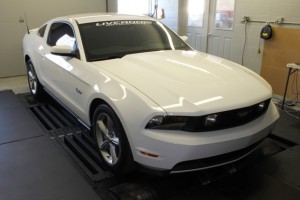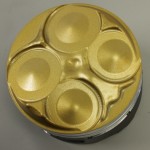 Naturally Aspirated Combo helps Deliver 11.15-sec. ET
Naturally Aspirated Combo helps Deliver 11.15-sec. ET
Dearborn-based Livernois Motorsports (livernoismotorsports.com) has wasted no time in cracking open Ford’s new “Coyote” 5.0-liter to draw out more power. They’ve built a high-compression version, using a prototype Ford Racing intake, which pumps the new 302 engine’s output from the factory 412-hp rating to more than 500 horses. Here’s how they did it:
- Custom Livernois-designed pistons with “stegosaurous”-style tops – peaks at the center of each valve relief that displace more air in the cylinders to increase the compression ratio from 11:1 to more than 12:1.
- Forged H-beam connecting rods in place of the stock powdered-metal rods, measuring the stock 5.93-inch length
- CNC-ported intake and exhaust ports in the factory four-valve heads
- Ford Racing Performance Parts prototype high-rise intake manifold, similar in design to the forthcoming Boss 302. Its tall, straight intake runners deliver greater velocity at high rpm, much like an old-school tunnel ram.
 The engine retains the stock camshafts and the exhaust blows through 1-7/8-inch long tubes. Backed by the stock six-speed automatic transmission in Livernois’ in-house test ’Stang, the engine was good for 441 rwhp – or about 520 at the crank.
The engine retains the stock camshafts and the exhaust blows through 1-7/8-inch long tubes. Backed by the stock six-speed automatic transmission in Livernois’ in-house test ’Stang, the engine was good for 441 rwhp – or about 520 at the crank.
“It’s an experimental engine to see what works,” said Livernois’ Dan Millen. “Already, we can see that the engine needs more camshaft. The intake delivers at high rpm, but we need the camshafts to reciprocate. We’ll work on that next.”
With the custom pistons, this recipe isn’t necessarily the most cost-effective way to add 100 horsepower, but it provides a glimpse at where the burgeoning new 5.0-liter world is headed. And the all-forged rotating assembly is the right foundation for forced induction (except for “bumpy” high-compression pistons heads) – although the 5.0’s super-thin, 0.060-inch-thick factory cylinder liners may be a cause for concern under boost. Nevertheless, this naturally aspirated combo works. Livernois’ Mustang has already posted an 11.15 ET at 122 mph, with a non-too-svelte race weight of 3,680 pounds.
